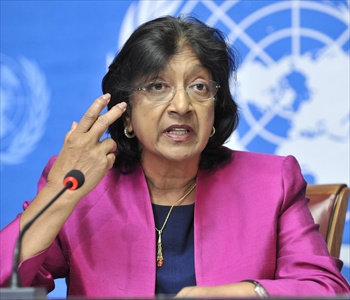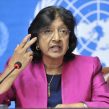
UN Human Rights Chief Urges Kazakhstan to Allow International Investigation into Zhanaozen
Publication: Eurasia Daily Monitor Volume: 9 Issue: 138
By:

Pressure by international human rights bodies on Kazakhstan’s government is increasing as the trials of political opposition leaders for their role in the December 2011 riots in Zhanaozen are approaching. The leader of the unregistered “Alga!” (Forward) party Vladimir Kozlov, a politician and activist of Khalyk Maydany (People’s Front) Serik Sapargali, and trade union organizer Akzhanat Aminov remain in detention while youth leader Zhanbolat Mamay was released on June 12 (see EDM, July 12; Interfax-Kazakhstan, July 13).
During her visit to Central Asia in July, the UN High Commissioner for Human Rights Navi Pillay criticized the government of Kazakhstan for its human rights record, particularly for its handling of the riots in Zhanaozen and subsequent court proceedings. She urged the Kazakhstani authorities to allow an independent international probe into the events in Zhanaozen and said that she would monitor the trial of Kozlov. At a press-conference in Astana on July 12, she said there were still too many unanswered questions about the violence last December, including differing narratives about how events unfolded, and the fundamental question as to whether or not the actions of the strikers warranted the use of live ammunition and whether this was both necessary and proportional (Interfax, July 12).
“I believe it is extremely damaging to Kazakhstan’s reputation to have so much uncertainty hanging over such a serious episode resulting in substantial loss of life. As a result, I have recommended to the government that the only way to credibly answer these questions once and for all, and draw a line under these tragic events, is to authorize an independent international investigation into the events themselves, their causes and their aftermath,” stated Navi Pillay (www.ohchr.org, July 12).
During her meetings with Kazakhstan’s authorities, she raised the issue of the arrest of opposition members, civil society and human rights activists, and lawyers, and called for transparency, the presumption of innocence, and access to legal protection. “In this context, I must say that in any proceedings for Zhanaozen, full justice has not been provided,” she concluded (Interfax-Kazakhstan, July 12). The Kazakhstani government responded that the UN High Commissioner for Human Rights had given a one-sided assessment of the events that took place in Zhanaozen (Interfax-Kazakhstan July 13).
While Ms. Pillay raised a number of legitimate concerns about restrictions of fundamental human rights such as freedom of expression and freedom of assembly, some of her statements on Zhanaozen were clearly unfounded. The authorities have taken responsibility for the use of lethal force in many statements, as well as through the Prosecutor General’s charges against five high-ranking police officers. The court in Aktau also determined that using live fire was not justified when other riot control methods were available. Five police officers were sentenced to prison for “abuse of authority with the use of weapons or special equipment” on May 28. The prison sentence was accompanied by confiscation of their property and a ban on holding office in law enforcement agencies for five years after their release.
Contrary to Ms. Pillay’s statement that it was not clear who gave the orders allowing police to open fire, the officer who gave the order to shoot at the rioters was, in fact, named, prosecuted and imprisoned. Kabdygali Utegaliyev, Deputy Head of the Department of Internal Affairs (DIA) of the Mangistau Region, who had been in charge of the consolidated police unit that confronted protesters and had given the order to open fire, received the heaviest sentence of seven years in prison.
Further in her statement, Ms. Pillay said that “few NGOs and journalists were able to work effectively in Zhanaozen in the immediate aftermath, partly because of its remote location in the far west of Kazakhstan, but mostly because of the security clampdown in the wake of the 16-17 December violence.” However, those who closely followed the aftermath of the events in Zhanaozen know that many media outlets provided continued coverage from the western Kazakhstani city. Representatives of regional media outlets and national correspondents, including the private satellite Channel 31, said that they practically lived in Zhanaozen after December 16 (author’s interviews, January 15). The opposition K Plus TV and Respublika newspaper reported daily from Zhanaozen, including from hospitals, detention centers and victims’ homes.
Ms. Pillay was right in claiming that an international investigation would answer once and for all questions such as whether torture was used on detainees and whether the investigation dealt properly with every single piece of evidence. But the UN itself missed the opportunity to take part or closely monitor the investigation of the Zhanaozen events. The Prosecutor General of Kazakhstan Askhat Daulbaev invited UN experts to participate in the process of investigating the riots in Zhanaozen on December 22, 2011 in talks with regional representative of the UN High Commissioner for Human Rights to Central Asia Armen Harutyunyan (georgiatimes.info, December 22, 2011). The talks did not produce an agreement because the UN insisted on conducting its own investigation while the Kazakhstani government refused to relinquish sovereignty over its jurisdiction (author’s interviews with Kazakhstani officials, January 14). The presence of UN experts, even if only to monitor the government’s investigation, would have answered questions about the use of torture and gathering evidence. In addition, it could have been a valuable capacity building exercise for Kazakhstani prosecutors and law enforcement.
The OSCE has also been critical of Kazakhstan’s government for not making progress in the last six months on several core Human Dimension issues central to the Helsinki Final Act, particularly following the arrests of members of the political opposition and trade unions. During its Permanent Council session on June 21, the OSCE also urged Kazakhstan to continue investigations into the Zhanaozen events, including allegations of torture or abuse of detainees. However, both the EU and US Ambassadors made a point of recognizing Kazakhstan’s efforts to provide information and make the trials transparent. The US Ambassador to the OSCE Ian Kelly stated: “We are heartened by the transparency of the trials in Aktau, as well as media access. We welcome the government’s attempts to bring to justice, not only private persons who broke the law by engaging in violent acts, but also police and other officials who abused or over-stepped their authority.” Ambassador Kelly continued in his statement: “We believe that many questions remain unanswered, however, and therefore urge the continuation of full investigation into the events, including allegations of torture or abuse of defendants” (osce.usmission.gov, June 21).




